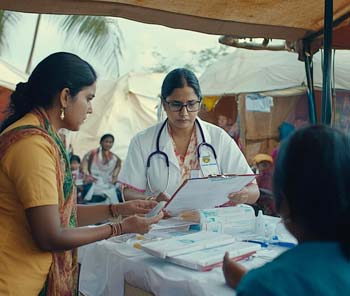

Cervical cancer is one of the leading causes of cancer-related deaths in Indian women, especially in rural and semi-urban areas. Many women don’t get screened due to lack of access, awareness, or affordability.
FitFem is a machine learning-based tool we are developing to help predict the risk of cervical cancer using health and genetic information. This platform is designed to assist healthcare workers, especially in low-resource settings, by offering a quick and intelligent way to assess a woman’s risk.
It provides a risk prediction score that can help doctors take early action and prioritize further testing.
FitFem is a pioneering innovation by a young school student, Sanjana Chauhan, whose out-of-the-box thinking has led to a potentially life-saving tool for women's health. In contrast to the conventional Pap smear-based screening, Sanjana envisioned an AI-powered solution that uses easily accessible health and lifestyle data along with a few low-cost genetic markers from a low-cost blood test to predict the risk of cervical cancer-particularly valuable in rural and underserved areas of India.
Her creative approach blends empathy with innovation, making early detection more affordable, scalable, and accessible. At such a young age, Sanjana has demonstrated the kind of social impact and scientific foresight that is truly inspirational.
Designed to be low-cost, perfect for rural clinics
Assists with decision-making, not a replacement
Early prediction means early action
 How FitFem Works – From Data Collection to Risk Prediction
How FitFem Works – From Data Collection to Risk Prediction
We combine medical knowledge with the power of Artificial Intelligence (AI) to identify risk factors from:
We trained machine learning models using real-world data collected from Indian women (both patients and healthy controls), and validated them using statistical techniques. Our early results are promising, with up to 90% sensitivity, meaning the model can detect most true cases.

Data was collected from women at the Department of Obstetrics and Gynaecology, King George's Medical University (KGMU), Lucknow. It includes various key risk factors including health data, lifestyle factors and few affordable cytokine gene variants.

We cleaned, selected, and transformed data into a form suitable for machine learning.

We trained different AI ML models to find patterns linked with cancer risk. Techniques used include:- Decision Trees - Random Forests - Support Vector Machines - Logistic Regression.

We tested the model’s performance on new, previously unseen patient records. The model achieved:- Accuracy: ~80%- Sensitivity: ~90%- Specificity: ~75%

We are now building an interactive website with dedicated AI chatbot where health workers can input details and receive instant risk prediction for patients with recommendations.
Feature No. |
Feature Name |
1 |
Age (in Years) |
2 |
Place of Residence |
3 |
Educational Status |
4 |
Socio-economic Status |
5 |
Parity |
6 |
Age at First Full Term Pregnancy |
7 |
Menstrual Cycle Regularity |
8 |
Menstrual Hygiene |
9 |
Use of Contraception |
10 |
Smoking Status |
11 |
High-Risk HPV (HR-HPV) |
12–15 |
Cytokine Gene Variants (IL-6, IL-1β, TNF-α, IL-1RN) |
FitFem is ideal for organizations looking to make cervical cancer screening more accessible and impactful. We invite collaboration from:




Want to integrate our tool into your program? Contact us to explore collaboration!
This research was conducted ethically under the approval of the Institutional Ethics Committee at KGMU, Lucknow. All participants gave written consent, and data privacy is fully respected. The study follows international standards like the Declaration of Helsinki for human research.


Exploring advanced deep learning models to improve prediction accuracy.

Developing an Al-powered chatbot using Large Language Models to assist users and explain results.

Building a mobile application for field-level risk assessment and wider accessibility.

Ongoing clinical validation of the current prototype with real-world patient data.
Noida, Uttar Pradesh, India
Copyright © 2025 FitFem | All rights reserved.